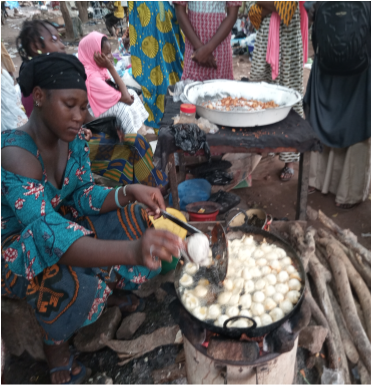Cowpeas Lost and Found - Women Traders Play a Critical Role
November 30 2020 - Author: Andrea Allen and Veronique Theriault
Listed among the Lost Crops of Africa (NRC 2006), cowpea had remained globally obscure until recently. Grown in large quantities across West Africa, cowpea can be consumed at different stages in its development (i.e., fresh green leaves and grain) and can be processed into value-added products (i.e., flour and doughnut). Cowpea has the potential to become the next superfood for alleviating hunger in Africa (NRC 2006:108, 106). The pace of research on cowpea production has quickened since early 2000s, but information beyond that continue to lag
In response to that lag, Dr. Veronique Theriault and colleagues (Figure 1) have launched their innovative investigation of “Quantifying the Scale and Scope of Nutritious Cowpea Products in Local Markets ” in Senegal and Mali. This project brings together collaborators from three leading research institutions: Michigan State University (MSU, US); Universite de Thiès (UT, Senegal); and Université des Sciences Sociales et de Gestion de Bamako (USSGB, Mali).
This research will fill the key gap from farms to consumers, by generating empirical evidence on the scale and scope of cowpea products traded in key hubs and satellite markets; changes in consumer preferences; opportunities for cowpea product expansion and implications for private sector engagement.
Figure 1: Team of Investigators
Veronique Theriault (Agriculture, Food and Resource Economics, MSU)Melinda Smale (Agriculture, Food and Resource Economics, MSU)
Aliou Diagne (Centre de Recherche en Economie et Finance Appliqués de Thiès, UT)
Mamadou Sissoko (Department of Business Administration, USSGB)
So where do gender analysis and women traders enter the picture? While this research topic has not stated a gender focus per se, the rigorous social science approach employed here – one which is not gender blind – assures that key gendered dimensions will be considered. In defining the content and scope of this work, the research design builds on evidence to date suggesting that women play a prominent role in current markets of both cowpeas and cowpea products (Figure 2). “Sales of cowpea is an important source of income for farm women who are often also part-time traders of grain, green pods, leaves, and foods prepared from cowpea local markets. Previous research has highlighted the prominent role of women throughout cowpea value chains in West Africa, and we seek to deepen understanding of that engagement toward policies that generate market-based incentives” (Theriault et al. 2019:8).
Hence, the simple act of applying a gendered lens to examine the research questions posed will undoubtedly result in a valuable contribution to gender and food systems research. Given that the researchers work in close collaboration with national market information systems, women’s groups as well as university faculty and students in both countries, project outputs and capacity for continued research generation and application will remain after the life of the project. As a result, “if market-based incentives for nutritious products are strengthened, beneficiaries include not only the producers and traders of goods but also the nutritionally vulnerable members of society who will consume them” (Theriault et al. 2019:9).

Another notable quality of the study is the intent to identify incentives for inclusive market systems, i.e. increased opportunities for small-scale enterprises led by women. In addition to information on gender, data on traders and consumers will include other socio-economic and demographic characteristics, which will allow to examine the intersectionality that likely exist therein. This information will serve to improve market inclusivity by informing policymakers and donors on best intervention strategies and by considering potential impacts on women traders, who often lose market power as product sales shift from primarily subsistence to market-oriented and informal to formal markets. With the harvest season for cowpea fast approaching, the team is getting ready to bring new empirical evidence on the scope and scale of processed and cowpea-based products available to consumers in Mali and Senegal. Stay tuned!
Presentation at 2021 Global Legume Lab Convening.
Reference
National Research Council (2006) Lost Crops of Africa: Volume II: Vegetables. Washington, DC: The National Academies Press. https://doi.org/10.17226/11763.
Theriault, V., M. Smale, A. Diagne, and M. Sissoko (2019). Quantifying the Scale and Scope of Nutritious Cowpea Products in Local Markets. Research proposal to FTF Innovation Lab for Legume Systems Research, Area of Inquiry 2- Integration of legumes within local/regional market systems, including trade.



